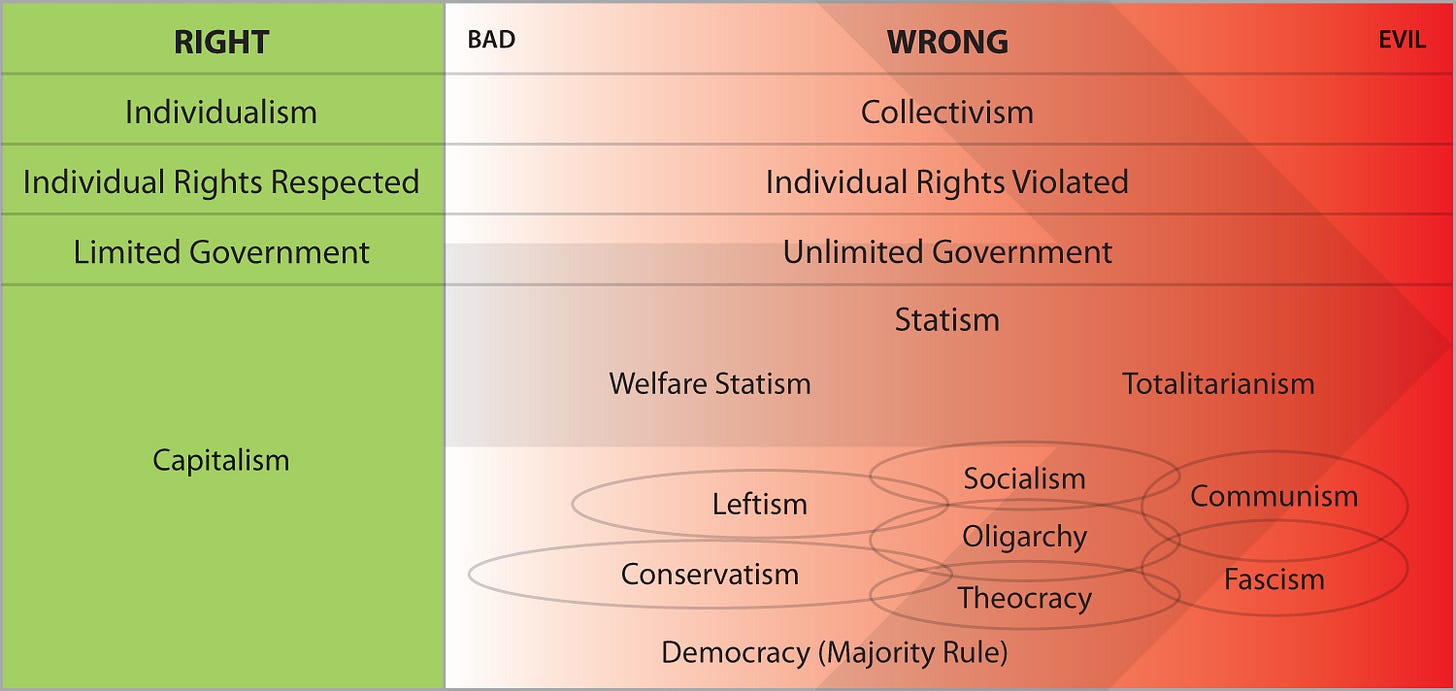Thinking Right or Wrong, Not Left or Right About: Energy
The Trump administration has a unique opportunity to unleash American energy and increase the protection of individual rights in the process.
One of the few bright spots in the Trump administration is the duo of Chris Wright as head of the Department of Energy and Doug Borgum as Interior Secretary. Both are unequivocal champions of liberating American energy and of government energy neutrality, the idea that the government shouldn’t play favorites by using tariffs, subsidies, taxes and regulations to promote—or punish—certain energy sources, be they fossil fuels, wind, solar, nuclear, hydro, etc.
Chris Wright’s agenda reads like a Christmas wish list for those who champion human progress and oppose the Anti-Human Flourishing Complex (AHFC): the cabal of politicians, regulators, educators, NGOs, and mainstream media who want to choke progress in the name of “saving the planet.” Doug Borgum’s plan for the Department of Interior is not far behind, and as it relates to energy, closely aligned. Both are influenced by pro-human flourishing energy expert Alex Epstein’s plan for solving America’s electricity crisis as outlined in his recent testimony to the House Oversight Committee, and his 112-point Energy Freedom Plan. To the extent this will be implemented in the next four years, we may see a significant downward trend in energy prices. Energy freedom is critical to unleashing economic growth, or at least cushioning the blow from possible trade war recessionary fallout. More fundamentally, the above measures will move energy policy in the direction of the morally Right with strengthened respect for and protection of the individual rights of energy producers, distributors and consumers.
What does thinking morally Right or Wrong, not politically left or right, about energy mean? What does it mean to champion individualism—to respect and protect individual rights—in energy? What constitutes a limited government in this area? What does capitalism prescribe? What checks all the boxes in the green column?
© Anders Ingemarson, 2025
Under capitalism, fully respecting individual rights in the energy sector requires a total separation of state and everything energy related—exploration, extraction, distribution, and consumption. Here is a list of what it would mean in practice. It is by no means comprehensive but should provide a taste of where we ought to be heading.
Governments (federal, state and local) transitioning out of land and offshore lease arrangements for energy production and distribution by selling land and offshore rights to the highest bidders (energy companies, real estate entities, or other private parties). The only valid role of government is
to act as steward of lands and offshore areas that have not (yet) been claimed by private entities for productive purposes, and
for the courts to adjudicate disputes that are not solved through arbitration.
Governments (federal, state and local) discontinuing energy related environmental and other permitting for mining, drilling, wind and solar farms, pipe- and powerlines, nuclear power plants, refineries, hydroelectric dams, etc. Public opinion—and insurance companies and other entities in the marketplace that stand to lose if something goes wrong—ensure that reasonable safety protocols are in place.
Repealing all federal energy regulations and phasing out all federal regulatory entities. This includes but is not limited to the Federal Energy Regulatory Commission (FERC), North American Electric Reliability Corporation (NERC), and Nuclear Regulatory Commission (NRC). The marketplace is perfectly capable of assessing risks and establishing necessary safety standards without government involvement (see the previous point).
Governments getting out of the business of regulating the disposal of nuclear waste. Again, insurance companies requiring that certain safety standards be met—and the opportunity for litigation when harm has been objectively proved—provide the necessary checks and balances.
Sunsetting all state level energy regulations of electricity and natural gas pricing, of energy mix use (fossil fuels vs. renewables), of electric grid management, etc.
Repealing all energy related state taxes and fees.
Shutting down state public utility commissions (PUCs) and energy departments.
Ending all government (federal, state and local) energy related subsidies.
Discontinuing the use of eminent domain for all energy related projects. In the free marketplace, energy industry entities negotiate with individual property owners to gain access across their lands for
constructing pipe- and powerlines,
exploring for and extracting coal, oil and natural gas, and
building power plants (coal, hydro, nuclear, etc.), wind and solar farms, refineries, and other energy related structures.
Discontinuing the strategic petroleum reserve. If the nation’s defense requires certain reserves, government contracts with private entities to maintain them.
Privatizing federal and state-owned energy entities such as the Tennessee Valley Authority (TVA).
Privatizing or closing down all federal energy related research facilities. Militarily sensitive facilities/projects may come with certain conditions such as security clearances and export restrictions which would be valid under a limited capitalist government.
Closing down the federal Department of Energy (I suspect Chris Wright would be elated to have made himself redundant).
We’re obviously a long way away from seeing an energy sector with an even playing field where individual rights are fully respected and protected for all participants—producers, distributors and consumers. But having a vision and concretizing how to get from here to there are essential steps on the road to the capitalist “shining city” (powered by inexpensive energy). Hopefully Chris Wright and Doug Borgum can take us part of the way.
PS. If you’re concerned with the environmental impacts of separating state and energy, rest assured that capitalism is the real deal for the environment.



Excellent, as usual. It provokes a question, however. One that I have asked of several thoughtful, intelligent, and insightful, Objectivists, and never received an "answer" in response.
In your mind, does this obvious "asset," together with whatever others the Trump administration may reflect, have influence in offsetting obvious "liabilities?" Was he and his constituencies a "better" or "worse" choice than Harris and hers? Why?